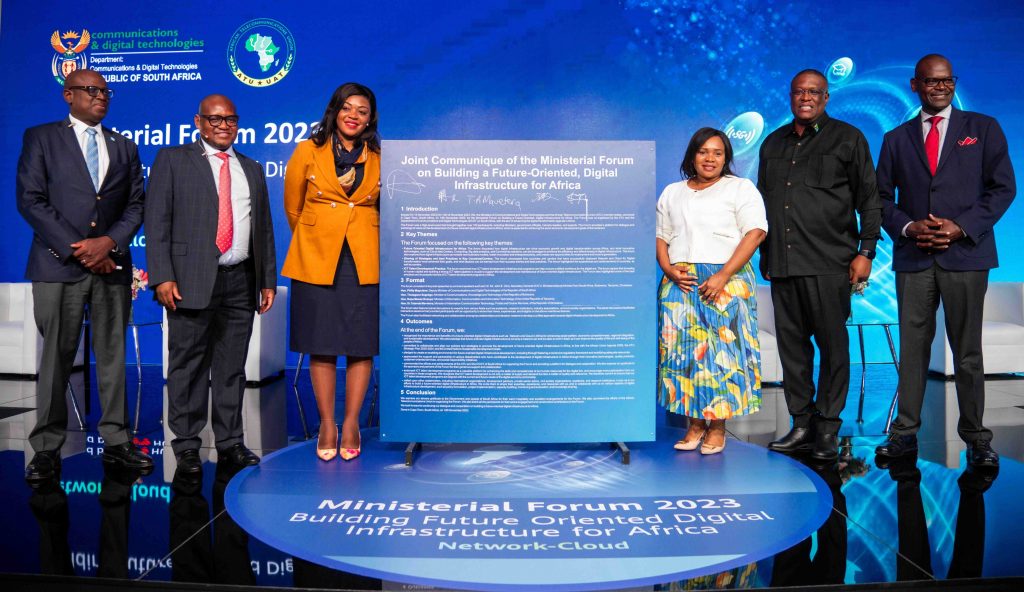South Africa’s esports scene is set for a major showdown as Hyprop and MTN introduce SHIFT COD, a Call of Duty tournament forming part…
Ministers and ATU call for collaboration to build future-oriented digital infrastructure for Africa

Ministers of Communications and Digital Technologies from across Africa, along with officials from the African Telecommunications Union (ATU), convened in Cape Town for the Ministerial Forum on Building a Future-Oriented, Intelligent Digital Infrastructure for Africa. The Forum, co-organised by the ATU and the Department of Communications and Digital Technologies (DCDT) of South Africa, aimed to advance the digital transformation agenda in Africa.
The event took place alongside AfricaCom, the continent’s premier ICT conference and exhibition, and provided a platform for dialogue and an exchange of views on the development of a future-oriented intelligent digital infrastructure in Africa. This infrastructure is essential for achieving the socio-economic development goals of the continent.
Digital technologies have proven to have an important impact on development. In fact, digital technology adoption reduces a series of economic
costs; namely, search costs, replication costs, transportation costs, tracking costs, and verification costs.
The Need for Collaboration
The development of the global digital economy has brought focus on the need for Africa to strengthen the construction of high-speed networks (4G, 5G, and fiber), as well as the implementation of high-performance cloud computing capabilities.
ATU Secretary General John Omo emphasised the importance of collaboration between all stakeholders in building a future-oriented digital infrastructure for Africa. He noted that inclusivity should be a guiding principle as we shape the future of digital infrastructure, ensuring that the benefits of technological advancements reach every corner of society.
South African Deputy Minister of Communications and Digital Technologies Philly Mapulane concurred with Omo’s call for collaboration. He stated that the gathering marked a significant milestone in the pursuit of a digitally empowered Africa.
Leo Chen, President of Huawei Sub-Saharan Africa, outlined how much progress the continent has made in building the digital infrastructure it needs while also outlining the areas that still need improvement. He advocated for Huawei’s One Network, One Cloud approach as a way to achieve these improvements.
Chen described the benefits of a One Network approach, including increased GDPs for countries across the region, enhanced government service delivery, and improved connectivity for individual households. He also mentioned the importance of cloud technologies and how they can be used to unlock huge potential in the “e-government” cloud.
The Importance of Affordability and Skills Transfer
Other dignitaries echoed the importance of collaboration for the future of African digital infrastructure.
Thulagano Merafe Segokgo, Minister of Communications, Knowledge and Technology, The Republic of Botswana, emphasised the need for affordable connectivity. He stated that if we are going to achieve connectivity at the level our citizens deserve, we must work together to ensure that connection costs don’t become a barrier.
Nape Moses Nnauye, Minister for Information, Communication and Information Technology, The United Republic of Tanzania, also stressed the importance of collaboration. He stated that collaborating is an important aspect if we want to achieve our goals and that we should work together to face the challenges together.
Dr. T A Mavetera Minister of Information Communication Technology, Postal and Courier Services, the Republic of Zimbabwe, added that collaboration should extend beyond digital infrastructure and include things like skills transfer and policy formulation.
Commitment to Collaboration
The communique, issued at the end of the gathering, committed the African countries present to, “collaborate and align our policies and strategies to promote the development of digital infrastructure in Africa, in line with the African Union Agenda 2063, the ATU Strategic Plan 2020-2024, and the United Nations Sustainable Development Goals” among other things.
In an example of the collaboration called for, the event also saw the presentation of the South African Fibre Broadband Development Initiative, a partnership between the Department of Communications and Digital Technologies (DCDT), the Digital Council Africa (DCA) and Africa Analysis. The initiative’s position paper, titled Toward a Gigabit Society in South Africa, analyses the positive impact that increased fixed broadband adoption will have in SA from a social and economic perspective. It outlines the current status and challenges, and proposes recommendations on strategy and policy interventions to turn South Africa into a gigabit society.
READ NEXT: Private equity firm raises $296m to drive digital inclusion

